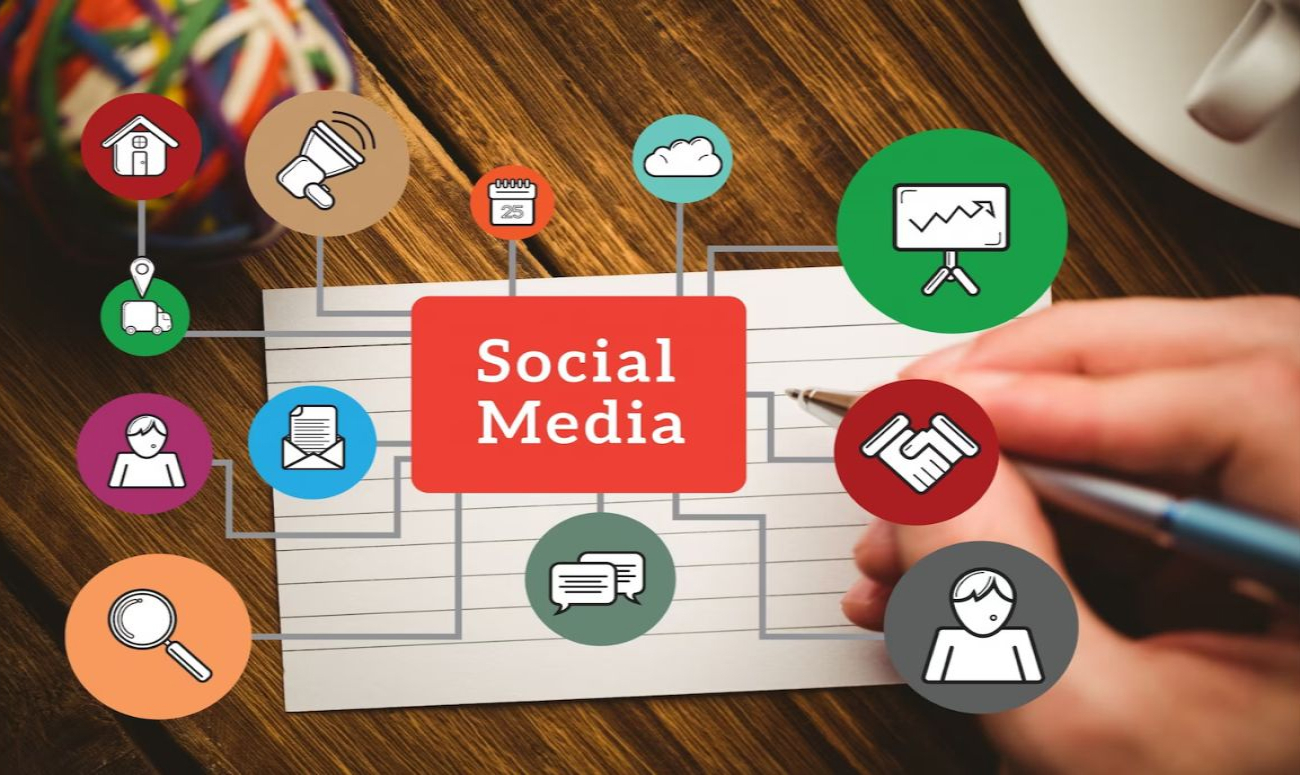The use of social media is becoming ubiquitous. People today spend the majority of their leisure time on social media platforms. It is an invaluable resource of information, knowledge, recent updates, sharing your likes and dislikes, industry-specific news, and much more. Therefore, businesses leverage it to promote their products and services and generate more leads from the online presence of individuals.
If you’re a business owner, it’s essential to stay up-to-date on the latest developments that can help your business achieve success. Gone are the days when simply having an online presence was enough – now, integrating technologies like CRM software and social media is vital for your business to thrive. By combining these two powerful tools, businesses of all sizes can gain advantages such as improved customer service, better lead management, and an overall profit increase. Companies can also create personalized experiences for their customers.
This blog post will discuss how businesses use CRM(customer relationship management) and Social Media integration systems to produce remarkable results for your organization. But before that, let’s understand the importance of personalization and how you can use social media information in your marketing campaigns.
Significance of Personalization

The importance of personalization in any business cannot be overstated. It allows companies to create a unique and engaging customer experience by providing tailored content. In addition, such personalized interactions create a strong connection between customers and brands, leading to increased loyalty and profits for the business.
For instance, On social media, you came across a headset of a particular brand, you liked the post, and left a comment expressing your desire to buy one. But you keep returning from their website due to the high price. Eventually, you see a substantial discount on the same headset and receive an email with a coupon code from the company. How do you feel? You feel valued and necessary because the brand caters to your preferences from social media, and you will be a loyal customer of that brand. This is why personalization is so important in the business world.
Personalization also helps businesses better understand their customer’s needs, resulting in improved services and more efficient operations. With the right data collected from customers, companies can create targeted campaigns that resonate with their audience, resulting in increased sales and more customer satisfaction.
Furthermore, personalization can lead to improved brand awareness and recognition, which can drive even higher levels of engagement.
The impact of personalized experiences on customer loyalty and retention

Personalization is critical to building strong connections between customers and businesses in today’s digital age. By providing customized experiences, companies can drive higher profits.
Customer trust and retention depend heavily on personalization. Businesses can create a powerful connection with customers that fosters brand loyalty and confidence by offering customers customized content, offers, and interactions. Customers benefit from personalized encounters by feeling heard, valued, and seen. Additionally, they can better comprehend customer requirements and develop advertisements that appeal to their target market.
Personalization on social media is an essential factor for businesses to survive in this digital age. With the right data collected from customers on various social media channels, companies can create targeted campaigns that resonate with their audience, resulting in increased sales and customer satisfaction. For instance, customers may be more likely to purchase a product or service if they receive personalized content on social media such as discounts or exclusive offers. Personalization can also encourage customers to engage with a brand and build a strong connection between them and the business, leading to increased customer loyalty. In conclusion, businesses should consider personalizing their customers’ experiences through social media as it can have a tremendous impact on both customer satisfaction and loyalty.
Moreover, businesses that offer personalization have seen sales conversion rates improve by as much as 30%. Similarly, personalized emails can lead to higher open rates of up to 50%. This means that companies investing in customized customer experience can reap tangible rewards in sales and revenue.
On the other hand, businesses that lack personalization risk losing customers due to indifference or insensitivity. Customers today expect personalization when engaging with brands, and any failure on this front will lead to increased churn rates. Companies must therefore focus on collecting customer data and using it effectively to provide tailored experiences that make customers feel appreciated and valued.
By leveraging the power of CRM (customer relationship management software) systems integrated with social media platforms, businesses of all sizes can create highly engaging content tailored to individual users’ needs and preferences. Such personalized interactions help build strong connections between customers and brands, leading to increased loyalty and retention and higher profits for the business overall.
Leveraging Social Media Data for Personalized Marketing

Utilizing social media channels and social listening can be compelling for personalizing a company’s marketing efforts. Social media data helps businesses better understand their customers’ wants and needs, allowing them to provide more tailored content that can nurture customer relationships and lead to higher conversion rates.
Companies can identify customers’ feelings about their products by gathering social sentiment data, which the marketing team leverages to create effective campaigns.
Social media analysis can also reveal new insights into what type of content resonates with the target audience. It allows companies to maximize their lead generation opportunities by providing the most attractive offers to potential clients.
Social media is a powerful tool for personalizing marketing campaigns. Leveraging data from various channels such as Facebook, Twitter, Instagram, and LinkedIn can give businesses (social media management) valuable insights about their customers and help them craft content tailored to their preferences and needs.
Most social media users discuss their interests and likes, acquire information from influencers, and share product reviews with their peers through social media posts online. Different social media platforms use distinct criteria for customer sentiment analysis:
Facebook Insights can reveal the number of people who like, share, and comment on your posts and the reach of your content. Twitter Analytics provides information regarding your comments and followers. It includes information about each tweet’s impressions, engagements, and interactions. Select the “Insights” tab on your Instagram profile page to access Instagram Insights. LinkedIn Insights is a feature that provides extensive information about your profile views, who has viewed it, and how you compare to other LinkedIn members.
Businesses collect this customer data from various social media platforms and gather it in a single place in CRM software which they use to build strategies. In addition, it provides a complete picture of the customer’s profile, allowing businesses to segment data based on various parameters, such as Buying trends, Queries, Product holdings, and Feedback (comments/reviews).
CRM and Social Media Integration: How does it work to improve business performance?

Social CRM integrates Social Media and Customer Relationship Management to enhance customer experience. Social media integration allows brands to gain insights into customer sentiment and engage with their audience more effectively on social channels. Social media campaigns can also be more precisely targeted, allowing for increased ROI for each effort.
Additionally, by collecting data from various sources, Social CRM can provide organizations with greater visibility into their customer interactions, enabling them to identify improvement points in their marketing strategies quickly. Finally, the integration of Social Media and Customer Relationship Management provides valuable feedback that organizations can use to adjust their approach to create better engagement, foster relationships, and generate higher levels of loyalty from customers.
When CRM is integrated with social media, businesses can sync contacts from their CRM database with their social media profiles. This allows them to easily track conversations, post content targeted to each customer, and identify potential leads by analyzing customer interactions on social platforms like Facebook, Twitter, Instagram, and LinkedIn.
CRM with Social Media Integration help businesses learns more about their customers so they can provide them with personalized experiences. An example is when a company uses influencers on social media to promote its products or services. They do this by offering customized experiences like discounts or special offers only for those influencers, which makes them more likely to share it with others and become brand advocates for that business.
How integrating CRM and social media benefits your business.
By leveraging customer data from social platforms, businesses can develop an in-depth understanding of their customer’s preferences. They can use this information to create targeted campaigns tailored to individual users. This helps create an emotional connection with customers, which increases their loyalty and trust in the brand leading to increased sales and higher profits.
Here are a few benefits of Social Media CRM – that help in business growth:
Improve customer engagement
Social customer relationship management software helps improve customer engagement by bridging the gap between the company and its target audience. By proactively engaging existing customers on social media sites like Facebook, Twitter, or Instagram, companies can cultivate a continuing relationship with existing customers that encourages them to re-engage.
Although some may not directly attribute increases in sales or profit as a result of improved customer engagement, it is easy to leverage existing customer comments or input as powerful marketing tools to attract potential customers – thus creating an impressive return on investment by utilizing social media presence efficiently.
Faster Responses
CRM with social media integration empowers sales teams to interact with customer inquiries in near real-time proactively. This helps marketing teams turn customer inquiries into sales opportunities faster. For example, with social CRM tools, customer interactions that were once limited to emails, phone calls, and customer service forms can now be shared on a company’s Facebook page or Twitter account.
In addition, these tools have social listening features that track customer posts for insights about customer needs and preferences even before an actual conversation. This information helps businesses provide faster response times and more relevant content when addressing customer questions or complaints.
Automation
Social CRM tools provide lead-generation capabilities that help automate the relationship between brands and customers. With social media integration, these tools allow brands to plan, schedule, and post to multiple channels automatically, promoting seamless, hassle-free interactions. In addition, the application of social CRM tools helps perform a variety of tasks, including understanding customer actions, analyzing customer demographics, and sending targeted offers or ads.
Automating through social CRM helps brands remain better connected with their customers, reducing the tedious tasks traditionally associated with contact management and maximizing opportunities for engagement.
Increases sales
CRM with social media integrations can also help businesses to increase sales. By using social media to promote their products or services, companies can reach a larger audience than they would through traditional marketing channels. Additionally, by using CRM to track customer interactions and purchase history, businesses can identify potential sales leads and target their marketing efforts accordingly.
Enhance customer service
Another benefit of social media CRM software is that it can help businesses to enhance customer service. By using social media to monitor customer feedback, businesses can quickly identify and resolve any issues that customers may be having. Additionally, by using CRM to track customer interactions, businesses can proactively reach out to customers who may need assistance.
Improves business performance
Ultimately, CRM with social media integration can help businesses to improve overall performance. Businesses can improve their bottom line by using social media to increase sales and enhance customer service. Additionally, by using CRM to track key performance indicators, companies can identify areas where they need to improve and make necessary changes accordingly.
Furthermore, social media CRM software also helps companies build stronger relationships with influencers and potential customers, resulting in more leads and conversions. By offering personalized experiences to these influencers, businesses can turn them into brand advocates. This helps them gain more exposure and attract more customers to their business.
Analyzing social media analysis and metrics and using them in CRM is a great way to improve customer retention and loyalty. Companies can use data collected from social media channels to gain insights into customers’ preferences, behaviours, and buying patterns.
Measuring the Impact of Personalization on Business Performance

Personalization has become a key element in today’s business operations, primarily due to its ability to resonate with customers and create deeper connections with the intended audiences. However, measuring the impact of personalization on business performance requires a 360-degree view of customer interests and engagement tools, as well as closely monitoring activities such as scheduling content posts, managing brand reputation, and evaluating key metrics.
By monitoring these variables regularly, businesses can adjust their strategy accordingly to ensure they take full advantage of their personalized plans and provide the best possible experience for their customers
Measuring the impact of personalization on business performance requires the use of a variety of metrics. For example, companies can measure the effectiveness of their personalized content by tracking comments, reviews, shares, retweets, video views, impression rates, and other social media parameters to know customer engagement levels. Companies should also track customer lifetime value (CLV) to gauge how profitable a customer is and measure customer satisfaction ratings to ensure customers receive the desired service level.
According to Forbes Article: 71% of consumers feel frustrated when a shopping experience is impersonal.
How to evaluate personalized social media marketing and customer support.

Evaluating the success of personalized social media marketing is critical to developing customer relationships and creating a better customer experience. This includes looking at customer profiles, data, and conversations on various social platforms. To ensure all this information is being taken into account while making decisions, it is vital to have an effective social CRM strategy in place. In addition, the sales team dedicated to customer service should also be able to identify when better customer support is needed and take full advantage of various social media tools, such as optimizing posts and creating customer surveys.
Businesses can develop an effective social-customer relationship management strategy by utilizing these tactics outside regular customer outreach communications and offering real-time customer interactions. This strategy allows for establishing personal connections with the customer through regular and meaningful engagement on multiple social media sites, providing better customer service.
The metrics to evaluate CRM and social media integration success
To measure the effectiveness of campaigns on various social media channels, there are multiple metrics that businesses should consider.

On Facebook, for example, businesses should measure metrics on various Facebook posts such as likes, comments, shares, reach (the number of people who saw your post), impressions (the number of times your post was shown), engagement rate (number of interactions divided by total reach), website visits, event responses, and video views.
On Twitter, it is essential to measure retweets, likes, and impression rate (the number of impressions divided by total followers).
It includes information about each tweet’s impressions, engagements, and interactions. You can use this information to monitor the performance of your tweets over time and make adjustments to enhance their effectiveness.
For Instagram, metrics such as likes, shares, and comments are essential. Still, hashtags used (to identify potential influencers) and posted stories should be monitored closely to get a complete picture of how effective campaigns are running.
LinkedIn also offers unique metrics, such as clicks on posts and messages sent, which should be considered when measuring campaign effectiveness.
These metrics help businesses understand how effective their campaigns on social media platforms have been in reaching new customers or engaging existing ones.
Final Thoughts
Personalization isn’t just a buzzword – it is a powerful way to manage customer relationships and engage with customers on a deeper level. By introducing CRM strategies and leveraging the social media ecosystem, businesses can take advantage of the amazing potential opportunities available with personalization technology. For example, it allows you to customize your audience target as per need and measure key performance metrics in real-time to gain an in-depth understanding of how your business is performing. On top of that, contact management and marketing automation solutions help companies effortlessly nurture relationships with their customers efficiently.
With an all-in-one social media management platform, you can stay ahead of the curve and easily target insights as per customer needs. CRM integration is becoming increasingly important for small to large businesses as it helps them centralize data and better understand their customers—all of which leads to improved workflow, automated processes, and, ultimately, growth. The best part? All these advanced techniques are available in one convenient social media management platform – click here to get the best social media CRM software and make the most out of advanced personalization solutions today!